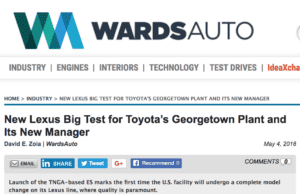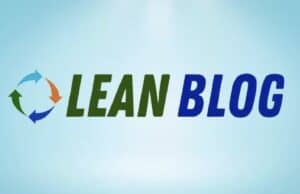Mark Graban
Should This Japanese Hospital React to a Dip in Kaizen Submissions?
Last week, I wrote Part 1 of this piece about TQM and "Small Kaizen" at a Japanese Hospital pharmacy.
The hospital was happy that employees were participating in their "Small Kaizen" process, but there was a month in which they saw the number of submitted Kaizens drop, from about 138 to 58 or so.
As I write about in Measures of Success, two data points usually don't make a trend.
Comparing Toyota’s Latest Ramp Up to Tesla’s
The first thing that prompted me to write this post is an interesting article about Toyota and their Georgetown, Kentucky plant that's known as TMMK (via Ward's Auto):
"New Lexus Big Test for Toyota’s Georgetown Plant and Its New Manager"
How does their approach and mindset seem to differ from Tesla?
Small Kaizen, Big Impact: Lessons from a Japanese Hospital Pharmacy
I'm overdue in writing more about my last trip to Japan a few months back.
Today, I'll like to share some highlights from one organization we visited, Seki Chuo Hospital, which is located outside of Nagoya. I have visited this hospital in 2012 and 2014 and it's interesting to see how their approach to Total Quality Management (TQM), Lean, and Kaizen has progressed and evolved. I mentioned them in a 2014 post about "quality circles."
Can You Answer “Yes” to These Three Important Workplace Questions?
I'm often reminded of three challenging questions that are asked by Paul O'Neill, former CEO of Alcoa and former US Treasury Secretary.
I've mentioned the questions before, in this blog post about Eric Ries and an employee's bill of rights. See more blog posts and my podcast with Mr. O'Neill.
Sadly, I'm reminded of the questions when I'm around people who cannot answer "yes" to them in healthcare workplaces. This is a widespread problem.
From Pets to Vets: Applying Lean in Unexpected Places [Podcast Preview...
I played host for a recent webinar that we're hosting on Monday, May 7, featuring a presentation by my friend Chip Ponsford, III, DVM (pictured at left), a veterinarian who has become quite a strong Lean advocate in recent years.
We've taught Lean together at a Veterinary Medicine conference (as I blogged about here) and I've been collaborating with Chip on his LeanVets.com blog.
Lessons from Tesla “Schooling” Toyota: Did You Get the Memo?
Tesla CEO Elon Musk has been quoted as saying he will "school Toyota on Lean manufacturing."
OK, let's take inspiration and lessons from the apparent Tesla Way management system. What would happen if hospitals and other organizations tried emulating Tesla instead of Toyota? What are the methods and mindsets? The behaviors and principles? What's the management approach and culture?
Quality Improvement Through Obfuscation?
Healthcare is full of terms that obfuscate things. Ironically, use of the word "obfuscate" can be an example of obfuscation.
Instead of saying, "Healthcare leaders often obfuscate a situation," we can say, "The language used in healthcare often makes things sound better or more complicated than they really are."
Podcast #307 – Andre DeMerchant, “You Can’t Cut Your Way to...
Joining me for Episode #307 of the podcast is my friend Andre DeMerchant, the President of DeMerchant Healthcare Solutions Inc., based in Kitchener, Ontario. We first crossed paths when we had the chance to work together with an American healthcare client via our then-affiliation with Pascal Dennis and Lean Pathways.
In today's episode, we talk about Andre's history working for Toyota in Canada and what he learned there -- and why it's important that he learned about "how flow works" at Toyota. We chat about the terms "Lean" and "The Toyota Production System" and what those words mean to him. How does TPS "transcend culture and language," as well as industries?
We then shift to talking about healthcare and some of the common challenges, including "financial hardships," that are faced in many countries. Why are hospitals "poorly prepared for change" in many cases? Another main theme is "cost cutting" and why you can't cut your way to success.
2018 Lean Healthcare Draft – Mock Draft Projections and Exclusive Fake...
Tonight is the start of the NFL Draft, which almost gets as much coverage nowadays as a Presidential election.
Can you imagine if CNBC and other TV channels spent as much time focusing on which Lean Healthcare prospects would be "drafted" from our leading universities and medical schools?
Here is our exclusive and official Lean Blog mock draft, featuring picks from our Lean Healthcare draft expert, Mel Kaizen, Jr.
Lessons from Tesla: Short-Term Thinking and Short-Term Layoffs
Again, Tesla and their CEO Elon Musk are generating a lot of news and, I think, many things to think about, even if the lessons learned are, perhaps, about things NOT to do in our organizations.
See previous posts about Tesla
As you might know, Tesla has been very much behind schedule with their Model 3 production ramp up. Last week, we saw news stories about a production shutdown that's intended to get things back on track:
"Tesla Is Temporarily Shutting Down Model 3 Production. Again."
Are short-term layoffs the best thing to do for the long term?
Hey Elon Musk: Toyota Never Thought “Humans are Underrated”
Over the past month, there's been so much in the news about Tesla. This column from Joann Muller, who covers the auto industry for Forbes, caught my eye again recently:
"Musk Thinks Tesla Will School Toyota On Lean Manufacturing; Fixing Model 3 Launch Would Be A Start"
It's not a direct quote (I don't think) from CEO Elon Musk that they will "school" Toyota on Lean manufacturing.
I'd suggest there's little evidence that Musk and Elon are even really trying Lean manufacturing as a strategy or a mindset. He's doing his own thing and will sink or swim accordingly.
Part 2: 20 Years Ago at GM, the Quality Death Spiral...
Recently, I blogged about a quality catastrophe that I lived through at GM just over 20 years ago, at the now-closed GM Livonia Engine Plant.
Bluntly, the quality problems were caused by poor management and the side effects of their decisions. Even though they constantly blamed workers, management directly interfered with workers and engineers being able to do the right thing for quality.
Here is Part 2 of that story... the first quality "spill" took place in April 1996. As I wrote about last time, Angry high-horse memos were sent out by management. Workers were told to have pride and to pay closer attention to quality (as if those had been the problems).







![From Pets to Vets: Applying Lean in Unexpected Places [Podcast Preview & Webinar Recording]](https://www.leanblog.org/wp-content/uploads/2018/05/chip-300x194.jpeg)








